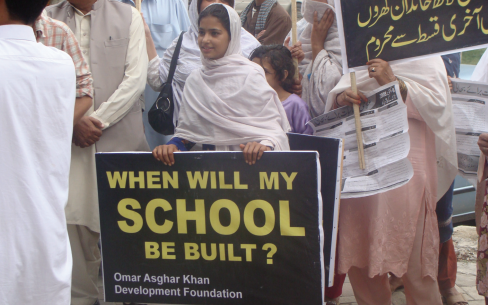What did I learn from 2 days of intense discussions on empowerment and accountability in messy places?
I wish I was one of those people who can sit zen-like through a two day academic conference, smiling and

Pakistan
constructive throughout. Instead I fear I come across as slightly unhinged â fidgety; big mood swings as I get excited, irritated or bored in rapid succession.
The most recent example of my failings was a two day conference at IDS last week on the role of âexternal actorsâ (aid agencies of all stripes) in building empowerment and accountability in fragile and conflict affected settings (part of the A4EA programme). Iâll kick off with some overall impressions, then drill down on a couple of issues in subsequent posts. It was Chatham House rules, so Iâll anonymise both people and countries.
Closing Civil Society Space: since the start of the A4EA project a couple of years ago, closing space for civil society activity has become more and more of an issue. Iâm not sure that advocacy or research has kept up with the pace of events. Some of the research themes that cropped up were
What do successful defensive strategies look like, whether at local or national levels. Is there any role for external actors in preventing crackdowns and repressive legislation, and if so what?
How are civil society organizations adapting to shrinking space: is it just weakening them, or might it actually have some positive consequences (eg in reducing their dependence on aid, or forcing them to build broader local coalitions)?
If the political arena previously occupied by formal CSOs is being shrunk, what new players, if any, are expanding into it? Are they good or bad guys in terms of their attitudes to inclusion, equality etc?
Which kinds of CSOs or activity are more vulnerable to shrinking space, which less. I imagine that human and womenâs rights organizations are likely to be most vulnerable, but itâs at least worth checking
What are the implications for research methods? We heard that in some countries, even the word âresearchâ is verboten – seen as roughly equivalent to âspyingâ by suspicious intelligence services. Does closing space change the relative merits of using local v international researchers?

Does âthinking and working politicallyâ have a built-in self-destruct button? Becoming more visible, whether through bigger budgets, or the kind of research we are doing, may be a double-edged sword for TWP. Size and publicity can increase impact and uptake by new organizations and individuals â the start of a movement, perhaps. But increased visibility is likely to draw unwelcome attention from governments who see it as spilling over into interference in national sovereignty â after all (just to be provocative), doesnât Russia stand accused of âthinking and working politicallyâ in the US elections? More parochially, we heard how increased size brings greater scrutiny from donor HQs, who are more likely to demand short term results, and less likely to tolerate a long phase of thoughtful experimentation. Maybe thereâs a good reason why all this stayed below the radar for so long.
Get the right Metaphor: On one level, a two-day gabfest like this one is a group of people chucking multiple ideas, words and metaphors into a common pool. You then see which ones get picked up and echoed in the conversations. I was struck by the uptake and versatility of Donella Meadowsâ metaphor of âdancing with the systemâ: itâs difficult to be a good dancer when they keep changing the music. You learn by going to dance classes (mentoring, exchanges, shadowing), not reading a book about dancing. The thing about fragile states is that you have a wider range of dance partners (traditional authorities, armed groups etc). You get the picture. That matters because the metaphor comes with assumptions and ideas attached, in this case the importance of responding to feedback, scepticism about pre-agreed plans etc.
Research and Practice: We had a brilliant mix of researchers, practitioners, and many who are both. Even so, I heard a rumbling undercurrent of discontent: âwhy do these academics take what we instinctively do as good aid workers, then dress it up in such complex language?â
Thereâs an awkward trade-off: Intellectualize an issue and you keep the donor happy (âthanks for your framework – it helped satisfy DFIDâ, said one practitioner), and the researcherâs academic career gets a boost. But even if they learn to speak the new jargon, practitioners feel alienated and disempowered â youâve taken our work and turned it into something unrecognisable. On the other hand, if practitioners communicate in their own language and vocabulary, they may feel empowered and can spread the word, but DFID doesnât get it and neither does the academic incentive system.
system.
Getting the balance right is enormously difficult â as Einstein once said, âMake things as simple as possible, but not simplerâ. Cheers, Albert.
Weâve all bought into the standard critique of not pushing cookie cutter solutions to different contexts. Context is king. But then, how much context is enough? For some at the more anthropological end of the spectrum, you can never delve deep enough â there is always more to understand about context. But that carries a high cost â nowhere can be compared to anywhere else; everything is unimaginably complicated. Eyes glaze over.
Finally, as Kate Raworth so brilliantly demonstrates in Doughnut Economics, diagrams and toolkits are the way the aid sector frames its thinking and practice. So they are a vital way in which new ideas can be packaged and spread. Unfortunately that can also carry the seeds of its own destruction: as subtle new ideas are dumbed down into checklists and adopted as part of compliance, they kill innovation and creativity, rather than the opposite.
All in all, a pretty stimulating couple of days. And I even got to swim in the Brighton sea before breakfast!
The post What did I learn from 2 days of intense discussions on empowerment and accountability in messy places? appeared first on From Poverty to Power.

Duncan Green's Blog
- Duncan Green's profile
- 13 followers



